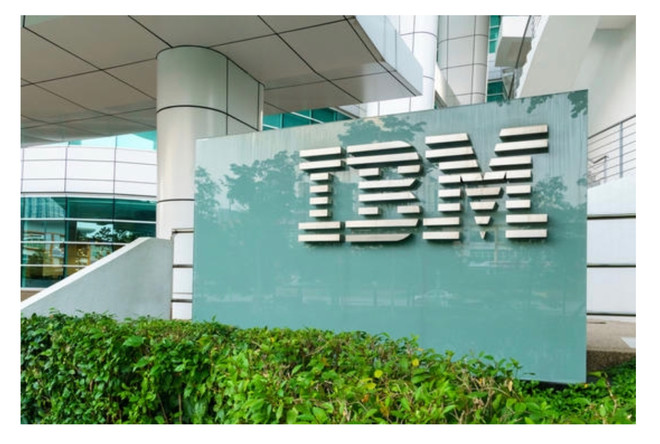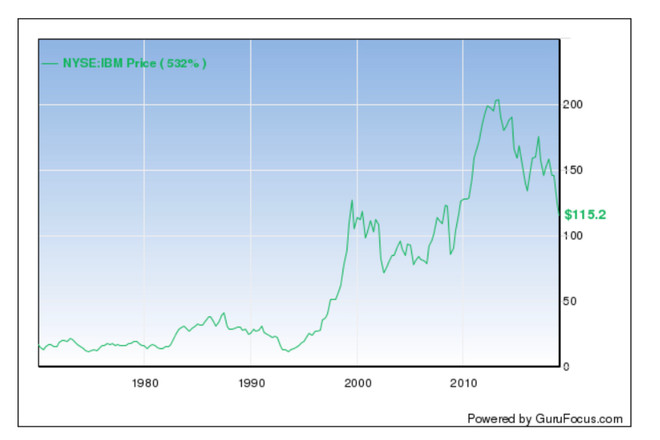how much did warren buffett lose on ibm?
how much did warren buffett lose on ibm?
https://www.gurufocus.com/news/651725/how-much-did-warren-buffett-lose-on-ibm-
International Business Machines Corp. (NYSE:IBM) has to be one of Warren Buffett (Trades, Portfolio)’s most high profile and biggest failures of all time. Big blue, which at one point was one of the four biggest positions in Berkshire Hathaway’s (NYSE:BRK.A) (NYSE:BRK.B) equity portfolio, initially looked like it was going to be a big winner.

As the years progressed, however, the company’s weaknesses showed up. As a result, over the final quarter of 2017, Berkshire exited substantially all of its stake in the business. Even though it is clear this was one of Buffett’s most substantial mistakes of all time (regarding dollars wagered), it does not appear as if he lost any money on this unfavorable investment.
Berkshire Hathaway’s IBM stake was first announced in 2011. In his year-end letter to investors, Buffett described the company’s leading position in the tech space and its desire to return billions of dollars in additional funds to investors over the next several years as key reasons for his decision to buy:
*********************************************
“Let’s do the math. If IBM’s stock price averages, say, $200 during the period, the company will acquire 250 million shares for its $50 billion. There would consequently be 910 million shares outstanding, and we would own about 7% of the company. If the stock conversely sells for an average of $300 during the five-year period, IBM will acquire only 167 million shares. That would leave about 990 million shares outstanding after five years, of which we would own 6.5%.
If IBM were to earn, say, $20 billion in the fifth year, our share of those earnings would be a full $100 million greater under the ‘disappointing’ scenario of a lower stock price than they would have been at the higher price. At some later point our shares would be worth perhaps $11⁄2 billion more than if the ‘high-price’ repurchase scenario had taken place.
…
In the end, the success of our IBM investment will be determined primarily by its future earnings. But an important secondary factor will be how many shares the company purchases with the substantial sums it is likely to devote to this activity. And if repurchases ever reduce the IBM shares outstanding to 63.9 million, I will abandon my famed frugality and give Berkshire employees a paid holiday.”
*********************************************
Buffett reiterated his stance on the company in 2016:
*********************************************
“What you pay for a stock doesn’t mean anything. What means something is where the company’s going to be in five to 10 years. I think IBM will be worth more money but, like I said, I could be wrong but we’ll accept that.”
*********************************************
It was only at the beginning of 2017 that he finally admitted he might have made a bad decision:
*********************************************
“I don’t value IBM the same way that I did six years ago when I started buying. I’ve revalued it somewhat downward. IBM is a big, strong company, but they’ve got big strong competitors, too.”
*********************************************
According to my calculations, between the first quarter of 2011, when Buffett started buying IBM, and the first quarter of 2016, when he completed his final purchase, he acquired 81,232,000 shares for a cost of $14.1 billion at an average price of $173.6 per share.

According to filings with the Securities and Exchange Commission, he disposed of this position at a price of between $174 and $153 throughout 2017. The lowest IBM traded in 2017 was $140 per share. The average price for the year was $153.
With an average all-in price of $173.6, we can assume Berkshire disposed of the bulk of its position with a capital loss. Regardless, the company is a dividend champion, so including dividend income, the picture changes altogether. Indeed, between the third quarter of 2011 and the final quarter of 2017, the company returned $29.2 per share to investors in dividends. Adding this cash return in, it looks as if Buffett had a favorable total return on his IBM holding overall.
At an average disposal price of $153 per share, including dividend income of $29.2 per share, the estimated total return is $182.2 per share, giving an estimated total gain of just under 5% for the whole holding period.
Granted, this is a dismal return, but at least it is positive